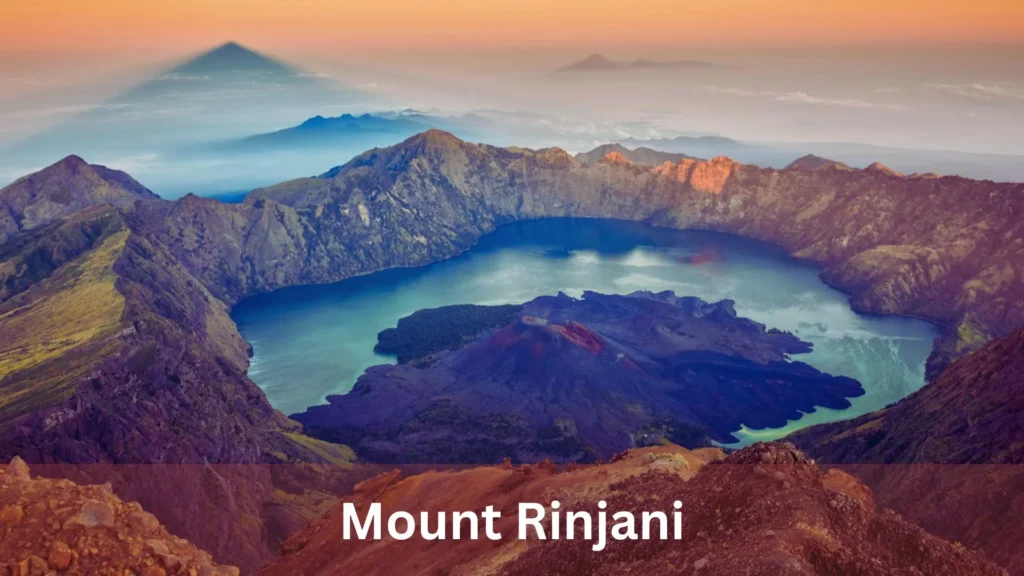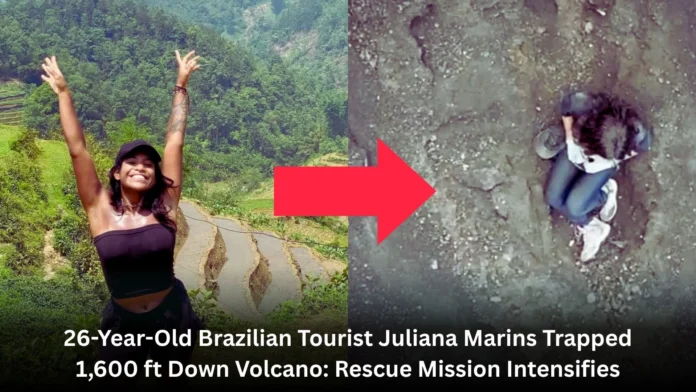A Routine Hike Turns into a Race Against Time
What was meant to be an adventurous morning hike turned into a harrowing ordeal when 26-Year-Old Brazilian tourist Juliana Marins fell from a cliff near the crater rim of Mount Rinjani in Indonesia. The incident occurred early Saturday morning, just before sunrise, under poor visibility conditions.
About 300 meters down a precipitous volcanic slope, Juliana stumbled while hiking with a group. The terrain, made more treacherous by fog and loose gravel, has since posed a significant challenge for search and rescue teams trying to reach her.
The Incident: How Brazilian Tourist Juliana Marins Got Trapped
Eyewitnesses from Juliana’s hiking group described the conditions as extremely difficult. One hiker mentioned that it was cold and dark, with only a basic lantern to light the way. Juliana, walking at the back with a guide, reportedly disappeared silently into the fog while navigating a slippery section of the trail.
Soon after her disappearance, drone footage and eyewitness accounts confirmed that Juliana was still alive. She was seen sitting upright on volcanic soil, apparently conscious and in shock. Rescue teams even reported hearing her screams, which gave hope to her family and the public following her story.
Mount Rinjani: A Popular Yet Dangerous Destination
At more than 3,700 meters, Mount Rinjani is Indonesia’s second-highest volcano and a popular destination for thrill-seekers. Its crater rim offers panoramic views, but the terrain is notoriously steep and unpredictable. Several hikers have suffered fatal falls in recent years, highlighting the risks associated with this otherwise scenic trek.

Rescue Challenges in Hostile Terrain
Despite immediate response efforts, Juliana’s location proved extremely difficult to access. The volcanic cliffs are unstable, and thick fog has grounded helicopters and impaired the effectiveness of thermal drones. Rescuers who attempted a descent had to stop halfway due to poor visibility and dangerous conditions.
At one point, they were just 250 meters away but had to turn back for safety reasons. New attempts have been made daily, but success has been hindered by relentless weather and rough terrain.
Family’s Plea and Public Outcry
Juliana’s family has expressed deep frustration on social media. They’ve claimed she’s been without food, water, or warm clothing for days. They also criticized park authorities for keeping the hiking trail open to tourists while the rescue operation was underway.
The family questioned why climbers were allowed to continue hiking in the area, stating it not only jeopardizes the rescue operation but also reflects a lack of urgency. Their emotional appeals have attracted widespread attention and support from across Brazil and beyond.
Authorities Respond
An official from Indonesia’s forestry ministry explained that keeping the route open was a measured decision. According to the official, the evacuation route is separate from the tourist path, and climbers were advised to stay away from the affected area. Closing the route entirely could have caused logistical complications for climbers already en route.
Despite these explanations, many have argued that rescue operations should have taken precedence over tourism. The incident has sparked a broader conversation about safety protocols and the responsibilities of park authorities in emergency situations.
Latest Developments
As of the latest update, drone surveillance has confirmed that Juliana has fallen even further down the cliffside. Rescue teams are regrouping and preparing for another attempt, pending improvements in weather conditions.
Two expert climbers with specialized training in high-altitude rescue have now joined the mission. They are equipped with advanced gear and plan to descend once fog clears and visibility improves.
The Brazilian embassy is closely monitoring the situation. Two diplomatic staff members have been dispatched to liaise with local authorities and provide support to the family.
A Glimpse Into Juliana’s Journey
Before the incident, Juliana had been traveling solo through Southeast Asia. Friends describe her as adventurous, resilient, and passionate about nature. Her social media feed was filled with scenic views from Thailand, Vietnam, and the Philippines—each destination part of a journey she meticulously planned.
Her fall at Mount Rinjani now casts a shadow over what had been a life-changing expedition. For those following her story, it is more than a tragic headline—it is a human struggle against the raw forces of nature.
What Happens Next?
The coming hours are critical. If weather conditions allow, the team will make another descent attempt. Medical personnel are on standby. Rescue leaders say that while every minute counts, safety for both Juliana and the rescuers must be prioritized.
Juliana’s family, meanwhile, continues to hope for a miracle and call for international attention to accelerate efforts.
Lessons and Takeaways
- Always Hike with Adequate Preparation: High-altitude hikes require more than enthusiasm. Proper gear, guidance, and timing are vital.
- Understand the Terrain: Know the risks associated with where you’re hiking. Volcanic and mountainous regions demand extra caution.
- Emergency Protocols Must Evolve: Park authorities worldwide must reevaluate emergency response frameworks, especially for high-risk tourist locations.
- Digital Tools Are Limited by Nature: Drones, GPS, and modern communication tools are powerful—but not foolproof in extreme environments.
Closing Thoughts
A reminder of the delicate balance between risk and adventure is provided by Juliana Marins’ experience at Mount Rinjani. As rescue teams work around the clock, the world watches, hoping that perseverance and human will can triumph over the towering challenge that nature has presented.
The story continues to unfold—one of courage, survival, and an international effort driven by hope.


